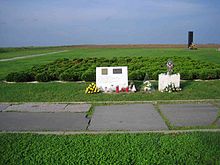Vukovar massacre
The Vukovar massacre , also known as the Vukovar hospital massacre or the Ovčara massacre , was a war crime committed by supporters of various Serbian militant groups, supported by members of the Yugoslav People's Army (JNA), during the breakaway of Croatia from the Socialist Federal Republic of Yugoslavia and immediately after the battle around Vukovar and the subsequent occupation of Vukovar by paramilitary Serb groups during the Croatian war.
The massacre took place on the site of the former Ovčara farm , a former pig farm near the Croatian town of Vukovar .
The massacre
According to reports from the ICTY (UN War Crimes Tribunal for Crimes in Former Yugoslavia), the Yugoslav army command had officially assured all patients, sick, wounded and civilians who were in the hospital in Vukovar, safe conduct to areas controlled by the Croatian government.
On November 20, 1991, the regular troops of the Yugoslav People's Army captured 400 patients from the Vukovar hospital, 300 of whom were taken to the former pig farm near Ovčara, just a few kilometers away.
100 of them were divided into groups of 10 and 20 and taken to nearby locations. 200 prisoners were murdered on November 20, 1991 by members of the Yugoslav People's Army and Serbian militants and buried in a mass grave . The officers responsible, Mile Mrkšić , Veselin Šljivančanin and Miroslav Radić , mentioned in the indictment, were indicted by the International War Crimes Tribunal in The Hague in 1995.
Legal processing
The ICTY indictment against Vojislav Šešelj listed 255 names in connection with the execution in Ovčara. Among them are a woman, a 77 year old man as the eldest and a 16 year old boy as the youngest victim of the massacre. Journalist Siniša Glavašević and Jean-Michel Nicolier , a French volunteer, were among the victims .
In September 2007 Mile Mrkšić was sentenced to 20 years and Veselin Šljivančanin to five years in prison. Miroslav Radić was acquitted of the charges. The judges dismissed all of them as unproven charges of conspiracy to commit murder and responsibility for the murder of civilians. In the revision of the judgment on May 5, 2009, Veselin Šljivančanin's sentence was increased to 17 years.
In Croatia the judgments were received with dismay. Euronews also reported on the ICTY's unexpected judgment.
In another criminal case before a court in Belgrade, 13 defendants were sentenced to a total of 193 years' imprisonment. Damir Sireta , a Serb with Croatian nationality , was sentenced to 20 years for war crimes in an individual trial, also in Belgrade.
denial
Although the ICTY ruling merely states that the acquitted Miroslav Radić could not be proven to have committed the crime, the Serbian daily Večernje novosti claims that the massacre did not take place at all.
See also
- Borovo naselje massacre
- Skirmish of Borovo Selo
- War crimes in Saborsko
- Škabrnja massacre
- Srebrenica massacre
- Croatian war
Web links
- The Yugoslavia Tribunal in The Hague brings more and more defendants behind bars in 1998. In: Die Zeit , No. 15/1998
- OE1, ORF - The Vukovar case and the UN tribunal. (Radovan Grahovac, October 6, 2007)
- BBC News - Vukovar massacre: What happened. 13 June 2003 (English)
- Mass graves - Ovcara, United Nations Commission of Experts
Individual evidence
- ^ Rule 61 hearing scheduled for three JNA officers charged with Vukovar hospital massacre , ICTY , icty.org, March 15, 1996, accessed on September 11, 2019
- ↑ euronews.net
- ↑ 193 Years In Prison For Ovcara Massacre. ( Memento of October 19, 2012 in the Internet Archive ) dalje.com, March 12, 2009, accessed on May 19, 2013
- ↑ Croatian Serb sentenced to 20 years imprisonment in Belgrade. Der Standard , June 23, 2009, accessed May 19, 2013
- ↑ un.org (PDF)
- ↑ Novosti report





